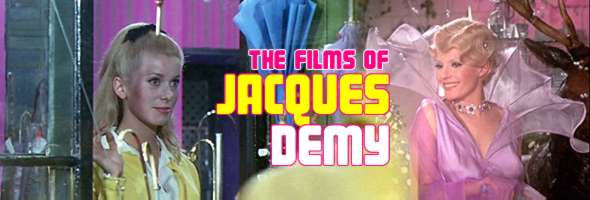
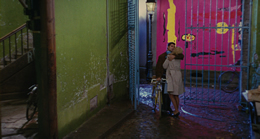 If you've ever felt like bursting out into a song in the middle of the street or wished you lived inside a movie set, Jacques Demy is the director for you. Still one of the most overlooked and misunderstood directors of the French New Wave, Demy has always been regarded as more artificial and lightweight than many of his contemporaries like Jean-Luc Godard and Francois Truffaut. Fortunately time has proven his bittersweet and often fantastic universe to be far ahead of its time, perhaps one of the most complete, fascinating cinematic worlds created by one filmmaker. An avid film fanatic and filmmaker from an early age, Demy quickly caused an international splash with his third and most beloved film, The Umbrellas of Cherbourg, while most of his other output received only nominal theatrical releases outside France (if at all) and became maddeningly difficult to find even on home video or television. Demy passed away in 1990, and by the end of that decade, his widow and fellow filmmaker, Agnès Varda, undertook the restoration of some of his key films, beginning with a major overhaul and worldwide release of Cherbourg.
If you've ever felt like bursting out into a song in the middle of the street or wished you lived inside a movie set, Jacques Demy is the director for you. Still one of the most overlooked and misunderstood directors of the French New Wave, Demy has always been regarded as more artificial and lightweight than many of his contemporaries like Jean-Luc Godard and Francois Truffaut. Fortunately time has proven his bittersweet and often fantastic universe to be far ahead of its time, perhaps one of the most complete, fascinating cinematic worlds created by one filmmaker. An avid film fanatic and filmmaker from an early age, Demy quickly caused an international splash with his third and most beloved film, The Umbrellas of Cherbourg, while most of his other output received only nominal theatrical releases outside France (if at all) and became maddeningly difficult to find even on home video or television. Demy passed away in 1990, and by the end of that decade, his widow and fellow filmmaker, Agnès Varda, undertook the restoration of some of his key films, beginning with a major overhaul and worldwide release of Cherbourg.
However, even today with occasional retrospectives popping up, his work after 1973 suffered from a lesser reputation and took an insane amount of effort to see, usually in poor copies without any English translation. The dream task of compiling all of Demy's films in one handy package with English subtitles was finally undertaken in France by Arte Video, who somehow managed to untangle the endless licensing issues around his later films and presented the complete body of work in immaculate transfers as the Intégrale Jacques Demy box set in 2008 -- all with English audio and/or subtitles. That stone cast in the water caused all kinds of ripples immediately, with several soundtrack compilations following in its wake and a batch of worldwide Blu-ray releases culminating in a spectacular 2014 combo Blu-ray and DVD set from Criterion, The Essential Jacques Demy.
LOLA
B&W, 1961, 90m.
Starring Anouk Aimée, Marc Michel, Jacques Harden, Alan Scott
Criterion (Blu-ray & DVD) (US RA/R1 HD/NTSC), Arte (Blu-ray & DVD) (France R0/R2 HD/PAL), Koch Lorber (US R1 NTSC) / WS (2.35:1) (16:9)
Demy's first film, Lola, immediately displays many of the themes, characters and visual motifs which would come to define his later films and still stands 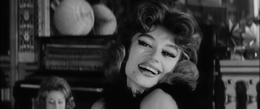 as an impressive achievement on its own. Fresh off her breakthrough role in Fellini's La Dolce Vita, Anouk Aimée dominates the entire film as the title character, a cabaret performer known for singing and gyrating in a top hat and very skimpy outfit. She's also a single mother and finds her life complicated by a chance encounter with Roland Cassard (Michel), a young man with an interesting in becoming a diamond smuggler who knew her as an adolescent. Immediately smitten, he becomes determined to win her over despite the fact that many other men are circling around her, including an American sailor on leave, while Lola pines away for the father of her child to return and legitimize her life.
as an impressive achievement on its own. Fresh off her breakthrough role in Fellini's La Dolce Vita, Anouk Aimée dominates the entire film as the title character, a cabaret performer known for singing and gyrating in a top hat and very skimpy outfit. She's also a single mother and finds her life complicated by a chance encounter with Roland Cassard (Michel), a young man with an interesting in becoming a diamond smuggler who knew her as an adolescent. Immediately smitten, he becomes determined to win her over despite the fact that many other men are circling around her, including an American sailor on leave, while Lola pines away for the father of her child to return and legitimize her life.
Filmed in Nantes, Lola quickly establishes the seaside town setting and iris effects at the beginning and end which would come to reappear in Demy's films, 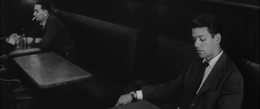 which otherwise grew more stylistically extreme and fantastic in content. Various characters swirl around one another looking for happiness, always idealistic if only rarely connecting at the moments in which they should. Add to that the ravishing mobile scope photography by Raoul Coutard (who went to shoot all of Godard's most important '60s films) and a gentle, catchy score by frequent Demy collaborator Michel Legrand, and you've got one of the key art house films of the 1960s.
which otherwise grew more stylistically extreme and fantastic in content. Various characters swirl around one another looking for happiness, always idealistic if only rarely connecting at the moments in which they should. Add to that the ravishing mobile scope photography by Raoul Coutard (who went to shoot all of Godard's most important '60s films) and a gentle, catchy score by frequent Demy collaborator Michel Legrand, and you've got one of the key art house films of the 1960s. 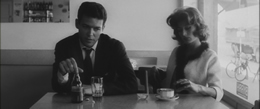
Lola first appeared on DVD in the US from Fox Lorber (later Koch Lorber) in a transfer of the 2000 film restoration, which also appeared in a few theatrical venues. This disc looked fine for its time but appeared a bit soft and obviously PAL-converted, and it was quickly discontinued. The Arte version from France features better compression and, being in PAL like the original master, features better motion rendering and is just slightly crisper. Optional English subtitles for both appear to be the same. The French disc also includes (without English subs) the original French theatrical trailer, a poster gallery, a video discussion of the film with critic Benoit Jacquot accompanied by numerous film stills, a verbal appreciation by Mathieu Demy reading a study by Demy biographer Jean-Pierre Berthome (a feature repeated for all the subsequent features), and a nifty installment from the '60s show Cineastes de notre temps with Demy talking about the film interspersed with home movie footage of the set. The same package was later carried over for a standalone Blu-ray release, though the video upgrade turned out to be minimal at best as the 1080p presentation also accentuates some egregious noise reduction that makes the film look mushier than it should.
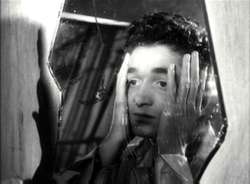 Lola is the first film in the Criterion set, sporting a transfer identical to its French counterpart. It's easily the weakest presentation in the set by a very wide margin, with issues stemming from the fact that the negative was lost in a fire and apparently the meticulous restoration was compromised somewhere along the line by that aforementioned overzealous noise reduction. A trio of Demy short films are the highlight of the supplements: 1950's "Le sabotier du Valde Loire" (23 minutes) is a beautiful character study of a provincial shoemaker coming to grips with his postwar life and relationship to the fading world around him; 1959's "Ars" (18 minutes) uses amazing tracking shots, voiceover, and gothic visuals to tell the story of a rural pastor whose unsparing sermons and self-criticisms left an unusual legacy; 1951's "Les Horizons Morts" (8 mins.)
Lola is the first film in the Criterion set, sporting a transfer identical to its French counterpart. It's easily the weakest presentation in the set by a very wide margin, with issues stemming from the fact that the negative was lost in a fire and apparently the meticulous restoration was compromised somewhere along the line by that aforementioned overzealous noise reduction. A trio of Demy short films are the highlight of the supplements: 1950's "Le sabotier du Valde Loire" (23 minutes) is a beautiful character study of a provincial shoemaker coming to grips with his postwar life and relationship to the fading world around him; 1959's "Ars" (18 minutes) uses amazing tracking shots, voiceover, and gothic visuals to tell the story of a rural pastor whose unsparing sermons and self-criticisms left an unusual legacy; 1951's "Les Horizons Morts" (8 mins.) 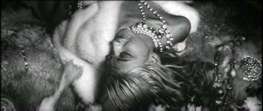 is an overt Cocteau homage with Demy himself headlining a story about a young man's surreal self-realizations in the attic bedroom of his home. Also included is a sort-of short film, "La Luxure," Demy's installment in an anthology feature, The Seven Deadly Sins (1962), which also featured contributions from Claude Chabrol, Jean-Luc Godard, Roger Vadim, and others each covering one of the seven deadly sins. This time it's "lust," as seen through the eyes of a young boy who's driven by Bosch's paintings to imagine that dreaming about sexy women leads to fiery hell. It's a visually sumptuous 14-minute treat, shot lovingly in scope and nicely preserved here. Hopefully the whole film will make it to English-friendly release at some point. Other bonuses include a 2012 interview with the still-elegant Aimée conducted by Varda (not surprisingly, the actress is still very fond of the film), a brief Varda interview apparently from the same session in which she discusses the origins of Lola's signature song (with a little archival footage of composer Michel Legrand for good measure), the trailer, and a restoration featurette in Los Angeles showing the sometimes astounding measures taken to repair badly damaged film frames, including the entire digital sub tit uti on of a door in one shot.
is an overt Cocteau homage with Demy himself headlining a story about a young man's surreal self-realizations in the attic bedroom of his home. Also included is a sort-of short film, "La Luxure," Demy's installment in an anthology feature, The Seven Deadly Sins (1962), which also featured contributions from Claude Chabrol, Jean-Luc Godard, Roger Vadim, and others each covering one of the seven deadly sins. This time it's "lust," as seen through the eyes of a young boy who's driven by Bosch's paintings to imagine that dreaming about sexy women leads to fiery hell. It's a visually sumptuous 14-minute treat, shot lovingly in scope and nicely preserved here. Hopefully the whole film will make it to English-friendly release at some point. Other bonuses include a 2012 interview with the still-elegant Aimée conducted by Varda (not surprisingly, the actress is still very fond of the film), a brief Varda interview apparently from the same session in which she discusses the origins of Lola's signature song (with a little archival footage of composer Michel Legrand for good measure), the trailer, and a restoration featurette in Los Angeles showing the sometimes astounding measures taken to repair badly damaged film frames, including the entire digital sub tit uti on of a door in one shot.
BAY OF ANGELS
B&W, 1963, 89m.
Starring Jeanne Moreau, Claude Mann, Paul Guers
Criterion (Blu-ray & DVD) (US RA/R1 HD/NTSC), Arte (France R2 PAL), Koch Lorber (US R1 NTSC) / WS (1.66:1) (16:9)
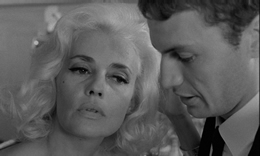 Another flawed woman inhabits the center of Demy's second film, Bay of Angels (Baie des anges), on the surface a more simple and slight tale set among the glittery, treacherous casinos of Nice, another seaside staple of French culture. Here we first iris out in a stunning opening shot on Jackie (Moreau), a platinum-haired, cigarette-succored vamp who trolls the gambling halls in search of her next quick fix. Enter Jean (Army of Shadows' Mann in his film debut), a milquetoast young bank clerk lured by a buddy into an afternoon's diversion playing games of chance. After winning a game of roulette, Jean is quickly hooked and becomes entranced with Jackie, whose addiction has robbed her of much of her sense as well as custody of her only
Another flawed woman inhabits the center of Demy's second film, Bay of Angels (Baie des anges), on the surface a more simple and slight tale set among the glittery, treacherous casinos of Nice, another seaside staple of French culture. Here we first iris out in a stunning opening shot on Jackie (Moreau), a platinum-haired, cigarette-succored vamp who trolls the gambling halls in search of her next quick fix. Enter Jean (Army of Shadows' Mann in his film debut), a milquetoast young bank clerk lured by a buddy into an afternoon's diversion playing games of chance. After winning a game of roulette, Jean is quickly hooked and becomes entranced with Jackie, whose addiction has robbed her of much of her sense as well as custody of her only 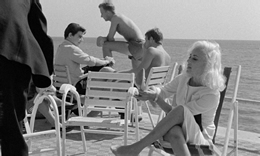 child. Their gambling fever soon escalates as their own relationship evolves into something that could either blossom into romance or push them over into oblivion.
child. Their gambling fever soon escalates as their own relationship evolves into something that could either blossom into romance or push them over into oblivion.
Graced with a dynamic, piano-fueled Legrand score and a marvelous final visual flourish, Bay of Angels feels like it's spinning in circles on purpose but etches a memorable portrait of two personalities vying for dominance with no idea of how it will end. 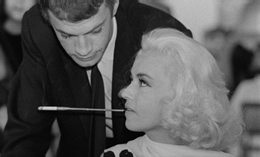 Already established as a major star at the time thanks to Jules and Jim, Elevator to the Gallows and The Lovers, screen legend Moreau really controls the entire film with her incomparable presence, turning a pitiable floozy into a multi-dimensional woman whose actions from one scene to the next remain highly unpredictable. It's simple and much darker and obsessive than the usual Demy fare, but as a bid to keep step with the growing French New Wave, this is a worthy installment. Bay of Angels was restored and released in tandem with Lola both in revival houses and on DVD in 2001, likewise going out of print in the U.S. The French DVD benefits from a better encoding and the native PAL presentation, which renders the two biggest tracking shots of the film more smoothly, and extras this time also include more Benoit Jacquot comments, the theatrical trailer, and a poster gallery.
Already established as a major star at the time thanks to Jules and Jim, Elevator to the Gallows and The Lovers, screen legend Moreau really controls the entire film with her incomparable presence, turning a pitiable floozy into a multi-dimensional woman whose actions from one scene to the next remain highly unpredictable. It's simple and much darker and obsessive than the usual Demy fare, but as a bid to keep step with the growing French New Wave, this is a worthy installment. Bay of Angels was restored and released in tandem with Lola both in revival houses and on DVD in 2001, likewise going out of print in the U.S. The French DVD benefits from a better encoding and the native PAL presentation, which renders the two biggest tracking shots of the film more smoothly, and extras this time also include more Benoit Jacquot comments, the theatrical trailer, and a poster gallery.
However, the Criterion is by far the more desirable option as the restored HD transfer is a pure knockout from start to finish, boasting a gorgeous silvery veneer and sometimes jaw-dropping levels of detail. Black and white in 1080p doesn't come much better than this. In addition to another restoration demonstration (nowhere remotely as challenging as the prior film) and the trailer, extras here include a vintage 13-minute interview with a ridiculously charismatic Moreau on the set of the film conducted for the French television show Cinepanorama and a 10-minute interview with Marie Colmant, co-author of a book about Demy, who talks about the prominence of outcast women in his body of work.
THE UMBRELLAS OF CHERBOURG
Color, 1964, 91m. / Starring Catherine Deneuve, Nino Castelnuovo, Anne Vernon, Marc Michel
Criterion (Blu-ray & DVD) (US RA/R1 HD/NTSC), Arte (Blu-ray & DVD) (France RB/R2 HD/PAL), Studio Canal (Blu-ray & DVD) (UK RB/R2 HD/PAL), Koch Lorber (US R1 NTSC), Optimum (UK R2 PAL) / WS (1.85:1) (16:9) / DD5.1/4.0/2.0
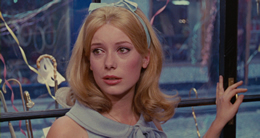 Now we arrive at the film by which all of Demy's others are measured, The Umbrellas of Cherbourg. It's difficult to underestimate the impact this film had on popular culture, earning a quick fan following in the U.K. and America while generating two hit singles, revolutionizing the use of art direction in film, and making a celebrity out of Michel Legrand with his
Now we arrive at the film by which all of Demy's others are measured, The Umbrellas of Cherbourg. It's difficult to underestimate the impact this film had on popular culture, earning a quick fan following in the U.K. and America while generating two hit singles, revolutionizing the use of art direction in film, and making a celebrity out of Michel Legrand with his 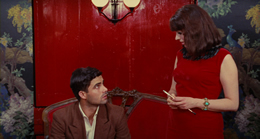 daring music, which runs nonstop throughout the film as every single line from the actors (no matter how mundane) is sung in a breakthrough fusion of jazz, pop and opera. The town of Cherbourg was outfitted with building fronts, interiors, bikes, and other accessories to match the colorful scheme of the entire film, which bursts with unbelievable Technicolor hues in every shot. Incredibly enough, this also happened to be the director's first film ever in color.
daring music, which runs nonstop throughout the film as every single line from the actors (no matter how mundane) is sung in a breakthrough fusion of jazz, pop and opera. The town of Cherbourg was outfitted with building fronts, interiors, bikes, and other accessories to match the colorful scheme of the entire film, which bursts with unbelievable Technicolor hues in every shot. Incredibly enough, this also happened to be the director's first film ever in color.
For some reason this film is usually thought of as an ode to undying young love, a ridiculous view if you actually watch it all the way through. The bittersweet story starts in 1957 and follows two young lovers, auto shop worker Guy (Nino Castelnuovo from Camille 2000 and Strip Nude for Your Killer) and umbrella store clerk Geneviève (Catherine Deneuve, fresh off her first big starring role in Roger Vadim's Vice and Virtue). Their bliss is cut short when Guy is summoned by the military to serve in Algiers, and they make before tearfully parting. However, Geneviève soon realizes she is pregnant and, at the urging of her mother (Therese and Isabelle's Vernon) when Guy fails to write to her, makes a fateful life choice. To reveal any more would spoil the enjoyment of this film, which somehow manages to mount a wrenching tearjerker plot in the most dazzling fashion imaginable; there isn't a scene that doesn't work perfectly, though Demy outdoes himself with a finale offering a resolution far closer to what might happen in real life than most viewers probably expected. And a gas station covered in snow at Christmas time has never looked more beautiful.
Much has been written about this film over the years, but all you really need to know is that this is simply one of the most intoxicating musicals -- or films, period -- you'll ever see. Legrand's score remains timeless, and the use of professional vocalists merges perfectly with the model-perfect actors performing onscreen. While the film works perfectly well on its own, it also gains immensely in emotional resonance on the heels of Lola as the character of Roland 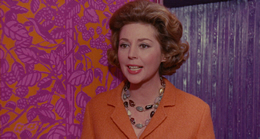 Cassard returns (again played by Michel), now a diamond jeweler whose back story contains a reprise of Legrand's original musical theme (and who plays a pivotal role in the second of the film's three acts).
Cassard returns (again played by Michel), now a diamond jeweler whose back story contains a reprise of Legrand's original musical theme (and who plays a pivotal role in the second of the film's three acts).
The restoration of Umbrellas supervised by Varda is an overwhelming experience on the big screen, and it took a long time before any home video version could come close to approximating the experience. Criterion's American laserdisc (their only stab at a Demy title for decades, incredibly enough) was a disappointment with murky colors and incorrect framing, a problem carried over to Fox Lorber's miserable, badly-encoded first DVD edition. Meanwhile an anamorphic transfer was released in France that was a huge improvement, even if colors were still on the muted side. Eventually a good, vivid edition came out with Fox Lorber's anamorphic reissue, which was carried over to the double-disc release from Optimum in the UK. Extras included the usual verbal appreciations as well as 11 minutes from Il etait une fois... les Paraplouies de 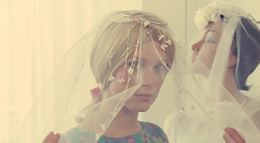 Cherbourg, a documentary about the film by Marie Genin and Serge July about the making of the film with some great footage of Michel Legrand at the piano. Also included were a poster gallery and the original 1964 trailer, which is sometimes supplanted by the 1999 reissue trailer on other releases, as well as an additional video featurette featuring observations from Virginie Ledoyen, an accomplished musical actress in her own right. The French Arte DVD features only the uncompressed PCM stereo track for the film, for those who want it exactly as presented in theaters.
Cherbourg, a documentary about the film by Marie Genin and Serge July about the making of the film with some great footage of Michel Legrand at the piano. Also included were a poster gallery and the original 1964 trailer, which is sometimes supplanted by the 1999 reissue trailer on other releases, as well as an additional video featurette featuring observations from Virginie Ledoyen, an accomplished musical actress in her own right. The French Arte DVD features only the uncompressed PCM stereo track for the film, for those who want it exactly as presented in theaters.
Despite its popularity, Umbrellas took a while to make it to Blu-ray (apart from a middling Japanese release from an outdated master) due to a revised restoration for the HD era overseen by Demy's family and premiered at Cannes in 2013. Not surprisingly, the Blu-ray in all three of its incarnations (American, French and British) is pure eye candy from start to finish with an often eye-popping appearance that's as close to the initial film restoration as you can possibly get in a home theater. In particular, the scenes shot with vivid red walls now register far more cleanly and impressively here, and every single shot finally has that "wow" factor felt on the big screen. Beautiful work. The extras from the Arte DVD are carried over for their Blu-ray, which also tosses in a generously illustrated 72-page book (in French), a look at the restoration, a brief 1976 Deneuve TV appearance discussing the film, and vintage footage of the film's Prix Louis Delluc win and Jacques Demy and Mag Bodard discussing it as well in 1985. The UK Blu-ray instead has a 66-minute audio interview with Deneuve, an 11-minute critical featurette with Geoff Andrew, the Ledoyen piece, the full 51-minute making-of doc, and The World of Jacques Demy, Varda's amazing 90-minute documentary about his entire career, packed with incredible on-set footage. If you ever wanted to see Jim Morrison visiting the set of Peau d'âne, this is the place. The Criterion disc also features the full Once Upon a Time... doc, the reissue trailer, and the same restoration demo from the other releases, but otherwise it sets itself apart courtesy of a new 22-minute film scholar piece with Rodney Hill (who makes some nice points about the film's combination of aesthetics, music and emotion), and an 11-minute vintage French TV interview with Demy and Legrand (from Cinepanorama again) complete with piano performances of the key music themes and some fascinating comments about Demy's relationship with Varda. There's also an audio excerpt of Legrand lecturing in 1991 about his work on Demy's films (26 minutes, in English) and an 11-minute chat with Deneuve from a 1983 appearance about Demy, both at the National Film Theatre.
THE YOUNG GIRLS OF ROCHEFORT
Color, 1967, 125m.
Starring Catherine Deneuve, George Chakiris, Françoise Dorléac, Gene Kelly, Jacques Perrin, Michel Piccoli, Danielle Darrieux
Criterion (Blu-ray & DVD) (US RA/R1 HD/NTSC), Arte (Blu-ray & DVD) (France R0/R2 HD/PAL), Miramax (US R1 NTSC) / WS (2.35:1) (16:9) / DD5.1
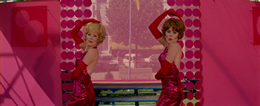 A sequel in spirit if not in story to Umbrellas is his next and certainly splashiest film, The Young Girls of Rochefort, an unabashed ode to MGM musicals set in the titular city whose nautical setting this time allows a return of Lola's lovelorn sailors as well as the addition of Demy's first big American star, Gene Kelly, as an American songwriter dreaming of love. Everyone else is either regretting the one that got away or dreaming of a lover who may not exist, which perfectly suits this film's switch from narrative-driven, feature-length singing to an all-out festival of dancing, sweeping camera movements, and numerous characters bouncing around in various configurations before settling into place for the final, perfect shot.
A sequel in spirit if not in story to Umbrellas is his next and certainly splashiest film, The Young Girls of Rochefort, an unabashed ode to MGM musicals set in the titular city whose nautical setting this time allows a return of Lola's lovelorn sailors as well as the addition of Demy's first big American star, Gene Kelly, as an American songwriter dreaming of love. Everyone else is either regretting the one that got away or dreaming of a lover who may not exist, which perfectly suits this film's switch from narrative-driven, feature-length singing to an all-out festival of dancing, sweeping camera movements, and numerous characters bouncing around in various configurations before settling into place for the final, perfect shot.
Deneuve returns again, this time paired with her real-life sister, Françoise Dorléac (the star of Roman Polanski's Cul-de-sac who tragically died in a car accident after making her next and final film, Ken Russell's Billion Dollar Brain). Not surprisingly, they also play sisters in the film, a pair of music-teaching twins named Delphine and Solange who dream of making the big time in Paris. Then there's Maxence (Jacques Perrin, who went on to a long career as an actor before directing the acclaimed Winged Migration), a blond sailor obsessed with his dream girl whom he's captured in a portrait-- and who looks strikingly like Deneuve. On top of that you also get another visiting sailor, Etienne (West Side Story's Chakiris), who wants the twins to help put on a song-and-dance show, as well as shop owner Yvonne (legendary actress Darrieux, who returned in future Demy films as well as Ozon's rapturous ode to the director, 8 Women), who ditched her fiance (Piccoli) because of his ridiculous last name. How it all turns out isn't really as important as the giddy, silly, and often flamboyant musical 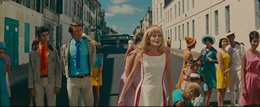 numbers, one of which even relates the story of a brutal axe murderer! That's just how love works in Demyville.
numbers, one of which even relates the story of a brutal axe murderer! That's just how love works in Demyville.
This film also received a theatrical reissue in the early '00s, this time from Miramax under the wing of Disney who also released it as a bare bones DVD. Much more satisfying was the French version, released as a standalone edition and repurposed slightly for the box set, then revisited in 2011 as a region free Blu-ray. The HD transfer, which is replicated on the equally impressive Criterion disc, 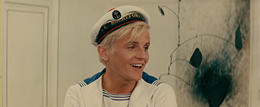 looks immaculate with a saturated and golden-hued Technicolor complexion that feels like a fresh 35mm print. On top of that both Blu-rays have a great retrospective hour-long feature by Varda, Les demoiselles ont eu 25 ans, which revisits the town 25 years later intercut with terrific footage shot during the making of the original film. Thankfully this bonus is also subtitled in English. Also included are the usual theatrical trailer and poster gallery. (The French DVD variant also as verbal commentaries). Incidentally, this film was simultaneously shot in an English version which, not surprisingly, was judged inferior and only made a few select TV appearances before disappearing completely; judging from the few surviving audio snippets of this variant, the loss isn't that great.
looks immaculate with a saturated and golden-hued Technicolor complexion that feels like a fresh 35mm print. On top of that both Blu-rays have a great retrospective hour-long feature by Varda, Les demoiselles ont eu 25 ans, which revisits the town 25 years later intercut with terrific footage shot during the making of the original film. Thankfully this bonus is also subtitled in English. Also included are the usual theatrical trailer and poster gallery. (The French DVD variant also as verbal commentaries). Incidentally, this film was simultaneously shot in an English version which, not surprisingly, was judged inferior and only made a few select TV appearances before disappearing completely; judging from the few surviving audio snippets of this variant, the loss isn't that great.
The Criterion also has another great little Demy/Legrand TV appearance, this time an 11-minute segment from the show Cinema. Then there's a new 26-minute video chat with Demy biographer Jean-Pierre Berthomé and costume designer Jacqueline Moreau, including some great tales about altering each item of clothing for the dancers depending on their routines ("And you could find little berets everywhere!") as well as a look at some original drawings and miniature models from the production. Behind the Screen is an episode from a Dutch TV program about the making of the film, spending 34 minutes with a cavalcade of behind-the-scenes footage from the shoot. The Miramax reissue trailer rounds out the Blu-ray; incidentally, the Varda doc on the Criterion Blu-ray is relegated to the second DVD of Un chambre en ville, presumably for space reasons.
MODEL SHOP
Color, 1969, 91m.
Starring Anouk Aimée, Gary Lockwood, Alexandra Hay
Arte (France R2 PAL), Sony (US R0 NTSC) / WS (1.85:1) (16:9)
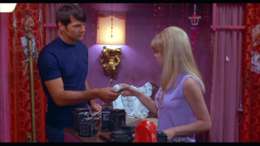 It was just a matter of time before the lure of Hollywood proved too strong for Demy to resist, and that opportunity came in 1969 with Model Shop for Columbia Pictures. This time he turns his camera to the dusty, pop culture-drenched landscapes of Los Angeles in a 24-hour period as experienced by George (2001: A Space Odyssey's Lockwood), a young aspiring architect about to be drafted whose apathy extends to spending his money on a car he doesn't need and finding little value in committing to his girlfriend, Gloria (Skidoo's Hay). With a payment due to keep his wheels, George trawls across town to find some cash but instead finds himself waylaid by a stop at the Model Shop, where pinup girls pose for clients in revealing lingerie (or less, though we're never shown in detail). There he's captivated by Lola (Aimée again), now living unhappily in L.A., whom he flirted with earlier at a gas station. As the day turns to night, George finds himself returning to the Model Shop again and striking up a rapport with Lola, whose destiny ultimately lies in his hands.
It was just a matter of time before the lure of Hollywood proved too strong for Demy to resist, and that opportunity came in 1969 with Model Shop for Columbia Pictures. This time he turns his camera to the dusty, pop culture-drenched landscapes of Los Angeles in a 24-hour period as experienced by George (2001: A Space Odyssey's Lockwood), a young aspiring architect about to be drafted whose apathy extends to spending his money on a car he doesn't need and finding little value in committing to his girlfriend, Gloria (Skidoo's Hay). With a payment due to keep his wheels, George trawls across town to find some cash but instead finds himself waylaid by a stop at the Model Shop, where pinup girls pose for clients in revealing lingerie (or less, though we're never shown in detail). There he's captivated by Lola (Aimée again), now living unhappily in L.A., whom he flirted with earlier at a gas station. As the day turns to night, George finds himself returning to the Model Shop again and striking up a rapport with Lola, whose destiny ultimately lies in his hands.
A commercial flop upon its release, Model Shop was quickly consigned to the dust bin along with many of its other late '60s/early '70s brethren, with only the occasional unheralded TV screening alerting anyone that it ever existed. However, fan interest grew over the years thanks to its status as a "lost" Demy project as well as the merits of its soundtrack; for the first time he did not collaborate with Legrand, instead using the rising Los Angeles band Spirit (who also appear in the film) to provide both the haunting instrumental score and a handful of songs (with some classical selections repeated from Lola for good measure). Needless to say, the film is far worthier than its neglect might indicate; the camerawork and art direction are never less than faultless (including another sweeping opening shot that recalls his first two films after the usual iris-in), and the generous footage of L.A. circa '69 is now a treasure trove unto itself. Not surprisingly, scenes from this turned up to great effect in the highly recommended documentary Los Angeles Plays Itself.
For many collectors, this valuable rarity was reason enough for many to pick up the French box set by itself, and thankfully the anamorphic transfer is a knockout. Colors are extremely rich and vibrant, and apart from some debris printed in during the optical effects of the opening credits, the presentation looks faultless. This was Demy's first film shot in English, and that track is preserved here with optional French subtitles. The disc (a dual-layered one paired up with Lola as described above) also includes another Benoit Jacquot commentary, Berthome's observations about the film, a poster gallery, and a six-minute segment of the B&W show Chronique Cinema with Demy talking about the film. Considerably less stacked is the later American DVD from Sony, which is taken from the same master but is worth picking up for completists as it contains the original U.S. trailer. Trivia note: Harrison Ford originally auditioned for the film but lost out to Lockwood.
DONKEY SKIN (PEAU D'ANE)
Color, 1970, 90m.
Starring Catherine Deneuve, Jean Marais, Jacques Perrin, Delphine Seyrig, Micheline Presle
Criterion (Blu-ray & DVD) (US RA/R1 HD/NTSC), Arte (France R2 PAL), Koch Lorber (US R1 NTSC) / WS (1.66:1) (16:9) / DD4.0
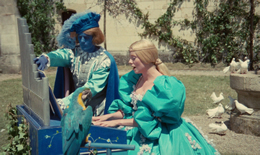 As Demy's first decade in filmmaking closed, he returned to France and made a startling shift in subject matter that would come to influence all of his subsequent films. Fairy tale aspects had certainly played a role in the stories he chose, but with 1970's Peau d'âne, known in English under the less appetizing title of Donkey Skin, he hurtled into outright fantasy with an enchanting ode to filmmaker Jean Cocteau.
As Demy's first decade in filmmaking closed, he returned to France and made a startling shift in subject matter that would come to influence all of his subsequent films. Fairy tale aspects had certainly played a role in the stories he chose, but with 1970's Peau d'âne, known in English under the less appetizing title of Donkey Skin, he hurtled into outright fantasy with an enchanting ode to filmmaker Jean Cocteau.
Based on a story by "Cinderella" author Charles Perrault, the film begins in a kingdom dominated by the color blue where the King (Cocteau regular Marais) grieves over the death of his beautiful wife, who told him he could only remarry if he found a woman as beautiful as she. Unfortunately the only 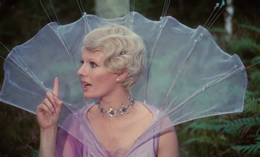 maiden in the kingdom who fits the bill is his daughter, the Princess (Deneuve), who apparently sits around at her organ outside all day singing about love while banquets are planned around her. When the King demands he marry her, the Princess is shocked and confused; however, a helpful visit from the Lilac Fairy (Daughters of Darkness's Seyrig) helps straighten things out with a song explaining why incest isn't such a great idea. Oh, yes, and the King gets much of his fortune from a magical donkey in his stable that eats straw and defecates jewels. To ward off her father's plans, the Princess follows the Fairy's advice and requests a string of seemingly impossible gowns made of the weather, the moon, and the sun, only to have them delivered; ultimately she has no recourse but to flee the kingdom, dressed in the hide of the magical donkey and posing in the nearby red-dominated kingdom as a peasant girl. However, she soon catches the eye of that region's lovesick Prince (Perrin), who devises a plan of his own to win her.
maiden in the kingdom who fits the bill is his daughter, the Princess (Deneuve), who apparently sits around at her organ outside all day singing about love while banquets are planned around her. When the King demands he marry her, the Princess is shocked and confused; however, a helpful visit from the Lilac Fairy (Daughters of Darkness's Seyrig) helps straighten things out with a song explaining why incest isn't such a great idea. Oh, yes, and the King gets much of his fortune from a magical donkey in his stable that eats straw and defecates jewels. To ward off her father's plans, the Princess follows the Fairy's advice and requests a string of seemingly impossible gowns made of the weather, the moon, and the sun, only to have them delivered; ultimately she has no recourse but to flee the kingdom, dressed in the hide of the magical donkey and posing in the nearby red-dominated kingdom as a peasant girl. However, she soon catches the eye of that region's lovesick Prince (Perrin), who devises a plan of his own to win her.
A delightfully odd and visually stunning experience, Peau d'âne features the same vivid Demy colors, costumes and Legrand musical numbers, but the sweeping camerawork has been replaced here with a more classical approach, framing almost everything in storybook-style medium shots. The sets are 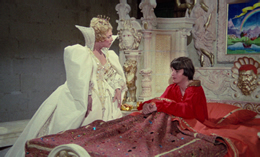 incredibly inventive and rely on charming, old school special effects (just check out the King's big white kitty throne or the bird and cat-themed masked ball), while the finale leaps into flat-out surrealism as the Fairy Queen's ability to travel through time results in a hilariously anachronistic entrance. The film became an instant favorite for viewers of all ages in France where it's regarded as a classic, though it found only sporadic acceptance elsewhere. All of the songs are terrific; as with Rochefort, Perrin gets the most haunting and heartfelt melody, while the magic cake-baking number is bound to bring a grin to the face of any viewer.
incredibly inventive and rely on charming, old school special effects (just check out the King's big white kitty throne or the bird and cat-themed masked ball), while the finale leaps into flat-out surrealism as the Fairy Queen's ability to travel through time results in a hilariously anachronistic entrance. The film became an instant favorite for viewers of all ages in France where it's regarded as a classic, though it found only sporadic acceptance elsewhere. All of the songs are terrific; as with Rochefort, Perrin gets the most haunting and heartfelt melody, while the magic cake-baking number is bound to bring a grin to the face of any viewer.
A fine restoration of the film was conducted by Varda and issued on a double-disc French DVD followed by an American one with essentially the same extras, which include the trailer, a 1908 silent short version of the story, an interview with producer Mag Bodard, "The Illustrated Peau d'Âne" (a look at text versions over the years), an odd video chat with two psychoanalysts, Demy's biographer and a literature professor dissecting the film's unusual themes, a peculiar photo/comic montage, and a cute little short, "Peau d'Âne and the Children," with school kids offering their own versions of the story. For some reason the first U.S. DVD presents the film with 2.0 and 5.1 stereo options while the French one opts for 2.0 and 4.0, but all of them sound rather comparable. The single-disc Arte version in the box set is the same apart from the addition of the usual newly-recorded Benoit Jacquot and Mathieu Demy chat tracks.
While the HD presentations in the Criterion box are almost all stellar, this one really takes the cake in its Blu-ray configuration. While previous prints and video transfers had a somewhat flat and sometimes splotchy look that was eventually presumed to be part of the way it was shot, the Blu-ray boasts far more depth and detail than any prior version and, apart from a handful of shots like the opening titles and the start of the Prince and Princess's superimposed dream song, looks like it could have been shot yesterday. The vibrant shades of red look particularly stunning, and viewers of all ages should find themselves unable to turn this one off once it's started. The DTS-HD 5.1 audio also sounds superb, essentially replicating the 4.0 mix of the French disc but with more dynamic range and obviously a considerably higher bit rate. Once again the extras also diverge quite a bit, carrying over only the "Illustrated" featurette. New here is Pour le cinema, a 1970 TV show with Demy, Deneuve, Marais and Perrin (in costume!) chatting for nearly 12 minutes about their love for the source material and the Cocteau homages interspersed with great production footage. "Donkey Skin and the Thinkers" is (not surprisingly) a more analytical 16-minute piece shot in 2008 with a mixture of psychoanalysts and historians (Camille Taboulay, Lucille Durrmeyer, Jean-Claude Polack and Liliane Picciola) having a roundtable discussion about the tale's approach to sexuality, gender politics, and family interactions. Finally, a 1971 audio recording from the American Film Institute features Demy chatting about his entire body of work and filmmaking approach with a student audience. (It's fun listening to him speak in English for so long, too.)
THE PIED PIPER
Color, 1972, 90m.
Color, 1972, 90 mins. 16 secs. Directed by Jacques Demy Starring Donovan, Donald Pleasence, John Hurt, Jack Wild, Diana Dors, Michael Hordern, Cathryn Harrison
Kino Lorber (Blu-ray & DVD) (US RA/R1 HD/NTSC), Arte (France R2 PAL), Legend (US R1 NTSC) / WS (1.78:1) (16:9)
A SLIGHTLY PREGNANT MAN
Color, 1973, 92m.
Starring Catherine Deneuve, Marcello Mastroianni, Micheline Presle, Mirielle Mathieu
Arte (France R2 PAL), Koch Lorber (US R1 NTSC), Optimum (UK R2 PAL) / WS (1.66:1) (16:9)
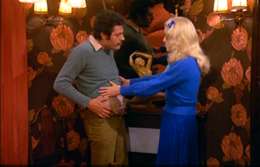 When The Pied Piper proved to be a commercial failure (no wonder considering how many kids it must have traumatized), Demy returned to France again for one of his lightest and most commercial films, the fluffy comedy A Slightly Pregnant Man (released in France under the far more cumbersome title of L'Événement le plus important depuis que l'homme a marché sur la lune, or "The Most Important Event Since Man Walked on the Moon"). Beauty salon worker Irene (Deneuve) is more than a little confused when her driver's ed teacher fiance, Marco (Mastroianni, her real-life beau at the time), is told by his physician that he's actually four months pregnant. Paris is thrown into an uproar and the scientific community is flipped upside down as Marco contends with his growing celebrity.
When The Pied Piper proved to be a commercial failure (no wonder considering how many kids it must have traumatized), Demy returned to France again for one of his lightest and most commercial films, the fluffy comedy A Slightly Pregnant Man (released in France under the far more cumbersome title of L'Événement le plus important depuis que l'homme a marché sur la lune, or "The Most Important Event Since Man Walked on the Moon"). Beauty salon worker Irene (Deneuve) is more than a little confused when her driver's ed teacher fiance, Marco (Mastroianni, her real-life beau at the time), is told by his physician that he's actually four months pregnant. Paris is thrown into an uproar and the scientific community is flipped upside down as Marco contends with his growing celebrity.
Extremely light on plot, this was the first of the odd pregnant man subgenre (followed by uneven efforts like Rabbit Test and Junior) and, like those followers, can't quite come up with a satisfactory solution to its provocative story hook; however, Demy manages to casually bat around issues of religion, abortion, feminism, and sexual orientation with ease, and even some musical content slips through with Mirielle Mathieu belting out the catchy theme song a couple of times. Of course, the usual eye-popping colors and wild production design choices (check out that big gold thumb!) are still present throughout.
Despite the presence of the stars and a reasonable public reception, the film didn't do much for the director's career. Still it became a video mainstay, usually in a horrendous English-dubbed version on VHS that turned it into a stupid farce. Fortunately the Koch Lorber disc in the U.S. contains the original French language version with optional English subtitles and a serviceable anamorphic transfer; amazingly, this still remains the definitive release as it also contains the English dub as a secondary option and the original trailer. The UK Optimum disc has the French track only with burned-in subs and looks far more compressed, while the Arte disc in the box set has the French and English tracks but no subtitles options.
LADY OSCAR
Color, 1979, 124m.
Starring Catriona MacColl, Barry Stokes, Christine Böhm, Jonas Bergström, Mark Kingston, Martin Potter, Patsy Kensit
Arte (France R2 PAL), Royal (Japan R2 NTSC), Filmax (Spain R2 PAL) / WS (1.85:1) (16:9)
LA NAISSANCE DU JOUR
Color, 1980, 90m.
Starring Jean Sorel, Dominique Sanda, Danièle Delorme, Orane Demazis
Arte (France R2 PAL)
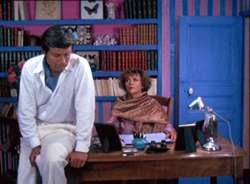 The following year Demy returned to France and helmed a much smaller scale but more personal project, a French TV version of La naissance du jour ("Break of Day"), based on the often-studied short novel by Colette more or less based on the writer's own autumn years. The meditative film feels a bit like a French Enchanted April as
The following year Demy returned to France and helmed a much smaller scale but more personal project, a French TV version of La naissance du jour ("Break of Day"), based on the often-studied short novel by Colette more or less based on the writer's own autumn years. The meditative film feels a bit like a French Enchanted April as 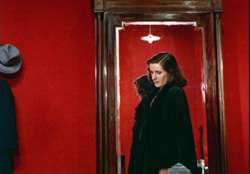 Colette (Danièle Delorme) spends her afternoons in the countryside of Saint Tropez writing outside about her transient attempts to love over the years, only to find her romantic yearnings awakened by the presence of the younger Vial (Jean Sorel, star of Bunuel's Belle de Jour and Fulci's A Lizard in a Woman's Skin), who apparently has a severe aversion to shirts. However, the subsequent arrival of Colette's younger, beautiful friend, Helene (Dominique Sanda, Bertolucci's 1900), threatens to take away her last chance at happiness.
Colette (Danièle Delorme) spends her afternoons in the countryside of Saint Tropez writing outside about her transient attempts to love over the years, only to find her romantic yearnings awakened by the presence of the younger Vial (Jean Sorel, star of Bunuel's Belle de Jour and Fulci's A Lizard in a Woman's Skin), who apparently has a severe aversion to shirts. However, the subsequent arrival of Colette's younger, beautiful friend, Helene (Dominique Sanda, Bertolucci's 1900), threatens to take away her last chance at happiness.
Subdued, tender, and intriguing, the film moves quickly through its 90-minute running time and is beautifully filmed, with Mendelssohn music coursing delicately through the soundtrack. This rarely seen gem makes its home video debut in Arte's box set and looks fine in this new film transfer in the original full frame TV aspect ratio. The same disc also contains Demy's first narrative work, a 1957 half-hour short version of Jean Cocteau's play, Le bel indifferent. Reputedly written for Edith Piaf, the spare drama charts the emotional torment of a woman known only as "C" (Jeanne Allard) waiting in a red-saturated hotel room for the arrival of her "indifferent" lover. When he shows up, she doesn't exactly find the happiness she expects to find. A great find for Cocteau and Demy-philes alike, it's a stylized and striking character study that stills plays beautifully. Agnes Varda contributes chats about both of the films on this disc in French only.
UNE CHAMBRE EN VILLE (A ROOM IN TOWN)
Color, 1982, 90m.
Starring Dominique Sanda, Danielle Darrieux, Richard Berry, Michel Piccoli, Fabienne Guyon
Criterion (Blu-ray & DVD) (US RA/R1 HD/NTSC), Arte (France R2 PAL) / WS (1.66:1) (16:9) / DD2.0
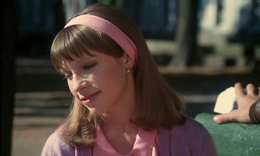 Of all the later Demy films ignored outside France, there's really no excuse at all for the mistreatment shown to his next film, 1982's Une chambre en ville (A Room in Town). Adopting the same sung-through style of Umbrellas of Cherbourg with a similarly intimate story, this much, much darker romance takes place in 1955 in the town of Nantes, which is paralyzed by labor demonstrations met with brutal police force. One of the strikers, a ship construction worker named François (La Balance's Richard Berry), rents a room in the home of Margot Langlois (Darrieux again), a widowed
Of all the later Demy films ignored outside France, there's really no excuse at all for the mistreatment shown to his next film, 1982's Une chambre en ville (A Room in Town). Adopting the same sung-through style of Umbrellas of Cherbourg with a similarly intimate story, this much, much darker romance takes place in 1955 in the town of Nantes, which is paralyzed by labor demonstrations met with brutal police force. One of the strikers, a ship construction worker named François (La Balance's Richard Berry), rents a room in the home of Margot Langlois (Darrieux again), a widowed 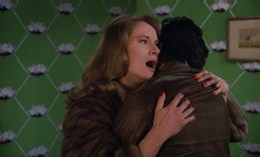 baroness now in decline whose daughter, Margot (Sanda), moved out a month ago to marry an abusive, impotent TV salesman (an unrecognizable Michel Piccoli in a spectacularly fierce performance). François is having a relationship with the sweet Violette (Guyon), who takes the relationship more seriously than he. Margot wanders the streets in her fur coat (with nothing on underneath), visiting a tarot reader who instructs her that she will fall in love with a metal worker; soon after that night she and François cross paths and fall immediately in love, spending a night of passion together. However, their possibly selfish happiness is immediately met with numerous obstacles, leading to a violent and tragic finale.
baroness now in decline whose daughter, Margot (Sanda), moved out a month ago to marry an abusive, impotent TV salesman (an unrecognizable Michel Piccoli in a spectacularly fierce performance). François is having a relationship with the sweet Violette (Guyon), who takes the relationship more seriously than he. Margot wanders the streets in her fur coat (with nothing on underneath), visiting a tarot reader who instructs her that she will fall in love with a metal worker; soon after that night she and François cross paths and fall immediately in love, spending a night of passion together. However, their possibly selfish happiness is immediately met with numerous obstacles, leading to a violent and tragic finale.
This time out the composer is not Michel Legrand but Michel Colombier (who immediately worked on much more mainstream fare like Against All Odds and Purple Rain), who contributes a wall-to-wall score often staggering in its intensity and romantic longing. While the worker sequences anticipate the smash stage version of Les Miserables to come, the characters' individual themes really carry the film (Violette's will stick in your head long afterward) and culminate in third act crescendos worthy of a classical opera. The casual nudity and startling violence (including a jolting throat slashing) are certainly new territory for Demy, but somehow he integrates them into his gorgeous aesthetic without throwing the project out of whack. It's a rare cinematic attempt to question to value of telling a love story, pushing the central romantic figures into highly unsympathetic terrain and questioning whether their proclaimed devotion for each other is really enough to justify the damage done to everyone around them.
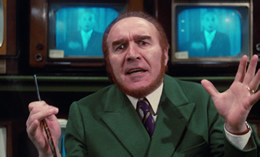 This unheralded latter-day masterpiece was infuriatingly hard to see in any form at all since its fleeting theatrical release in France; even repertory screenings and bootleg copies proved fruitless, and it never officially hit home video before finally appearing in the French DVD box set in a beautiful, colorful anamorphic transfer with an enveloping soundtrack. (The full two-disc CD was finally released in 2007 and also comes highly recommended.) Viewers with even a sketchy knowledge of French may opt to switch off the English subtitles, which tend to simplify many of the poetic verbal flourishes and also obstruct some of the marvelous camera compositions. Extras include two video analyses by producer and critic Gerard Vaugeois, a TV installment of Cinema cinemas with Demy promoting the film, the theatrical trailer, and a poster gallery.
This unheralded latter-day masterpiece was infuriatingly hard to see in any form at all since its fleeting theatrical release in France; even repertory screenings and bootleg copies proved fruitless, and it never officially hit home video before finally appearing in the French DVD box set in a beautiful, colorful anamorphic transfer with an enveloping soundtrack. (The full two-disc CD was finally released in 2007 and also comes highly recommended.) Viewers with even a sketchy knowledge of French may opt to switch off the English subtitles, which tend to simplify many of the poetic verbal flourishes and also obstruct some of the marvelous camera compositions. Extras include two video analyses by producer and critic Gerard Vaugeois, a TV installment of Cinema cinemas with Demy promoting the film, the theatrical trailer, and a poster gallery.
A most unexpected but welcome choice, this film finally made its American debut in any format as part of the Criterion set; not surprisingly, the Blu-ray is a knockout with a richly textured HD rendering that does full justice to Demy's stylized color schemes. As usual, the reds, purples, and blues look almost supernatural at times; it's a Technicolor feast of the highest order. The DTS-HD stereo track also sounds terrific with Colombier's music surging quite forcefully for an hour and a half. (However, that menu screen is really puzzling!) In addition to a new reissue trailer and a demonstration of the restoration conducted in 2013 (including some extensive audio work), the extras are all new here, kicking off with "Jacques Demy, A to Z," a 2014 visual essay by James Quandt covering the director's life, creative trademarks, and very specific location choices in depth for one hour. It's actually a pretty nice primer, and newcomers might be well advised to check this out before diving into the rest of the set. A 1987 Demy appearance at Finland's Midnight Sun Film Festival runs 16 minutes and features the director (on the eve of his final film) discussing the importance of cinema in his life and the circumstances behind the creation of some of his earliest films. It's long past time for American viewers to finally discover this astonishing, very powerful film.
PARKING
Color, 1985, 92m.
Starring Francis Huster, Laurent Malet, Keiko Ito, Gérard Klein, Marie-France Pisier, Jean Marais, Hughes Quester
Arte (France R2 PAL) / WS (1.66:1) (16:9)
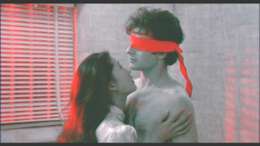 At this point it's worth noting that by the mid-1980s, French filmmaking was changing drastically. The old guard of the French New Wave was passing away (literally in Truffaut's case), and game-changing films like Jean-Jacques Bienix's Diva and Luc Besson's Subway were pushing the stylistic innovations of directors like Demy into new, more Americanized areas of pop culture. This perspective adds an interesting dimension to Demy's next film, 1985's wild and undervalued Parking, which found him reuniting with Michel Legrand for a modern, pop-driven version of the Orpheus myth so famously adapted by Jean Cocteau years earlier. Of course, the film also kicks off with a dedication to Cocteau and features that earlier version's star, Jean Marais, as Hades, ruler of the underworld, so that gives a pretty clear indication of where the project is coming from.
At this point it's worth noting that by the mid-1980s, French filmmaking was changing drastically. The old guard of the French New Wave was passing away (literally in Truffaut's case), and game-changing films like Jean-Jacques Bienix's Diva and Luc Besson's Subway were pushing the stylistic innovations of directors like Demy into new, more Americanized areas of pop culture. This perspective adds an interesting dimension to Demy's next film, 1985's wild and undervalued Parking, which found him reuniting with Michel Legrand for a modern, pop-driven version of the Orpheus myth so famously adapted by Jean Cocteau years earlier. Of course, the film also kicks off with a dedication to Cocteau and features that earlier version's star, Jean Marais, as Hades, ruler of the underworld, so that gives a pretty clear indication of where the project is coming from.
We first meet our protagonist, pop sensation Orpheus (Francis Huster, star of Andrzej Zulawski's La femme publique and L'amour braque), serenading and making love to his girlfriend, Eurydice (Ito), in his remote castle home/recording studio. He then hops on his motorcycle to Paris where he's mounting his latest spectacle at the Bercy theater. An electrical accident onstage causes him to die for a few minutes, during which he's escorted by Charon (Rose de fer's Hughes Quester) via car into the underworld, located in the depths of an austere parking deck. In the afterlife (where everything is monochrome except the color red), Hades decides to let Orpheus return but keeps an eye on him via his ward, Persephone (Marie-France Pisier), who occasionally wanders up to the world of the living. However, Orpheus and Eurydice have difficulty sustaining their relationship, and while he's off scoring a spectacular performance onstage, she takes drastic measures which will send him back to the parking afterlife once again.
Highly imaginative and packed with eccentric touches (like making Orpheus bisexual with a record producer boyfriend or depicting the famous walk back from hell this time with a bright red blindfold), Parking was decried by critics and audiences at the time, with Legrand griping at the decision to retain Huster's own vocals for the music instead of using a professional singer. Indeed his voice can't grasp all the demands of some of the songs (and you'll really want to tear off his red headband after about half an hour), but the music itself is actually very catchy and lots of fun while the film is never even remotely boring. The transitions in and out of the afterlife are especially effective, with the climax offering a satisfying modern twist that stays faithful to the original. The fairy tale approach works well, too, but this one definitely isn't for the kiddies as the frank nudity from Demy's previous film also turns up here. Once again this largely unseen film makes its mass video debut in the Arte box set and looks terrific; check out the muddy French trailer in the extras for an idea of how bad this must have looked for most audiences. Other extras include the usual critic commentaries, a poster gallery, and another Cinema cinema TV snippet with Demy talking about the film.
TROIS PLACES POUR LE 26
Color, 1988, 106m.
Starring Yves Montand, Mathilda May, Jean-Claude Bouillard, Catriona MacColl, Dominique Varda
Pathé (Blu-ray) (France R0 HD), Arte (France R2 PAL) / WS (2.35:1) (16:9) / DD2.0
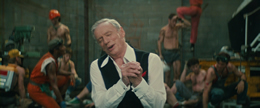 Before his death Demy completed one final film in 1988, Trois places pour le 26 ("Three Seats for the 26th"), an unabashed musical showcase for Yves Montand, one of the world's most popular entertainers of the past century. Fresh off the international success of Jean de Florette and Manon of the Spring, Montand cranks the charm up full force here and clearly relishes the chance to do a splashy, MGM-style song and dance film, which kicks off with a great sequence in which, playing himself, he arrives at his hometown of Marseilles to throngs of twirling reporters. Accompanied by American actress Betty Miller (Catriona MacColl again, showing a very different side of herself here), he's planning to stage a big production, Remembering Montand, which covers his loves and losses with plenty of razzle dazzle. Meanwhile the star struck young Marion (Mathilda May, everyone's favorite naked vampire from Lifeforce-- and yes, she disrobes again here) sees him on TV and conspires to get a role in his show,
Before his death Demy completed one final film in 1988, Trois places pour le 26 ("Three Seats for the 26th"), an unabashed musical showcase for Yves Montand, one of the world's most popular entertainers of the past century. Fresh off the international success of Jean de Florette and Manon of the Spring, Montand cranks the charm up full force here and clearly relishes the chance to do a splashy, MGM-style song and dance film, which kicks off with a great sequence in which, playing himself, he arrives at his hometown of Marseilles to throngs of twirling reporters. Accompanied by American actress Betty Miller (Catriona MacColl again, showing a very different side of herself here), he's planning to stage a big production, Remembering Montand, which covers his loves and losses with plenty of razzle dazzle. Meanwhile the star struck young Marion (Mathilda May, everyone's favorite naked vampire from Lifeforce-- and yes, she disrobes again here) sees him on TV and conspires to get a role in his show, 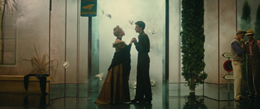 unaware that her baroness mother is his long-lost love from his past.
unaware that her baroness mother is his long-lost love from his past.
Featuring numerous nods to both Montand's and Demy's career (including one number packed with top hats and tails, multiple Marilyn Monroe lookalikes, and musical quotes from Some Like It Hot, The Umbrellas of Cherbourg, and Fred and Ginger), it's a sweet pastry of a film and a loving tip of the hat to the filmmaking legacy that give the star and director so much joy. Legrand's songs mix in some surprising (and occasionally very dated) electronic shadings here and there, but for the most part he sticks to old school arrangements which is as it should be. Yet another all-too-rare Demy title, this made its way overdue DVD debut from Arte with a sharp and very colorful transfer that retains the original clever scope compositions. The closing credits and a few shots here and there look a bit edge enhanced, but there's not much point quibbling when this was impossible to see at all beforehand, let alone with subtitles. Extras include a hefty tag-team video commentary with Varda, Rosalie Varda and Mathieu Demy, a half-hour '80s TV special on Demy's latter years called "Jacques Demy, ou l'arbre gemaeau," a poster gallery, the 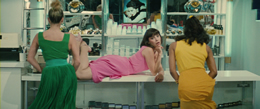 French trailer, and a 5-minute TV interview with Demy, "Portrait d'invite."
French trailer, and a 5-minute TV interview with Demy, "Portrait d'invite."
For some reason this particular title actually jumped French video labels on its way to Blu-ray, slipping out at the end of 2013 from Pathé boasting a 2K HD restoration. Of course, Pathé's track record has been very uneven with results ranging from glorious (Tess) to disastrous (Children of Paradise), but thankfully they seemed to keep a hands off approach here. It looks like an '80s film, of course, but fine film grain is intact and colors look as bright and punchy as they should. The DTS-HD 2.0 audio option sounds great and sounds far more flattering than the rechanneled 5.0 version, which is often wobbly and tinny by comparison. Subtitles in English and French are included, while the extras from the DVD are discarded (apart from the trailer) in favor of a new 34-minute featurette, "Dans les clouisses," about the making of the film (in French only) with participants like Mathilda May (still looking amazing) and costume designer Rosalie Varda reflecting back on the making of the film.
The Criterion box also comes with a 68-page book featuring new, solid essays about each film by Ginette Vincendeau, Terrence Rafferty, Jim Ridley, Jonathan Rosenbaum, Anne E. Duggan, and Geoff Andrew, with general notes by Jean-Pierre Berthomé. For the record, the Arte set also includes a bonus CD with Demy and Legrand interviews and recording studio chatter (in French only, naturellement), a hefty illustrated fold-out booklet, and best of all, another DVD packing in all of his short films: "Le sabotier du Valde Loire," "Ars," "Les Horizons Morts," "La Luxure," and a reel of rarities compiles three very short animated pieces, "Le Pont de Mauves," "Attaque Nocturne," and "La Ballerine." Finally the disc wraps up with even more critic commentaries, a quick vintage TV interview with Demy about "Luxure," and The World of Jacques Demy. All told, this treasure trove is easily one of the best box sets released in the DVD format's history and is easily worth the cost for any self-respecting fan of world cinema or just pure, energetic moviemaking at its finest.
As should be obvious by now, both the Criterion and Arte sets are highly recommended for different reasons. Either way, they make for a great introduction to a marvelous filmmaker, and one can only hope that either label will step up to the plate soon and provide HD editions of the few titles still currently available only in SD. Absolutely essential viewing; it's films like these that make you glad Blu-ray was invented.
Updated review on July 23, 2014.



 If you've ever felt like bursting out into a song in the middle of the street or wished you lived inside a movie set, Jacques Demy is the director for you. Still one of the most overlooked and misunderstood directors of the French New Wave, Demy has always been regarded as more artificial and lightweight than many of his contemporaries like Jean-Luc Godard and Francois Truffaut. Fortunately time has proven his bittersweet and often fantastic universe to be far ahead of its time, perhaps one of the most complete, fascinating cinematic worlds created by one filmmaker. An avid film fanatic and filmmaker from an early age, Demy quickly caused an international splash with his third and most beloved film, The Umbrellas of Cherbourg, while most of his other output received only nominal theatrical releases outside France (if at all) and became maddeningly difficult to find even on home video or television. Demy passed away in 1990, and by the end of that decade, his widow and fellow filmmaker, Agnès Varda, undertook the restoration of some of his key films, beginning with a major overhaul and worldwide release of Cherbourg.
If you've ever felt like bursting out into a song in the middle of the street or wished you lived inside a movie set, Jacques Demy is the director for you. Still one of the most overlooked and misunderstood directors of the French New Wave, Demy has always been regarded as more artificial and lightweight than many of his contemporaries like Jean-Luc Godard and Francois Truffaut. Fortunately time has proven his bittersweet and often fantastic universe to be far ahead of its time, perhaps one of the most complete, fascinating cinematic worlds created by one filmmaker. An avid film fanatic and filmmaker from an early age, Demy quickly caused an international splash with his third and most beloved film, The Umbrellas of Cherbourg, while most of his other output received only nominal theatrical releases outside France (if at all) and became maddeningly difficult to find even on home video or television. Demy passed away in 1990, and by the end of that decade, his widow and fellow filmmaker, Agnès Varda, undertook the restoration of some of his key films, beginning with a major overhaul and worldwide release of Cherbourg.  as an impressive achievement on its own. Fresh off her breakthrough role in Fellini's La Dolce Vita, Anouk Aimée dominates the entire film as the title character, a cabaret performer known for singing and gyrating in a top hat and very skimpy outfit. She's also a single mother and finds her life complicated by a chance encounter with Roland Cassard (Michel), a young man with an interesting in becoming a diamond smuggler who knew her as an adolescent. Immediately smitten, he becomes determined to win her over despite the fact that many other men are circling around her, including an American sailor on leave, while Lola pines away for the father of her child to return and legitimize her life.
as an impressive achievement on its own. Fresh off her breakthrough role in Fellini's La Dolce Vita, Anouk Aimée dominates the entire film as the title character, a cabaret performer known for singing and gyrating in a top hat and very skimpy outfit. She's also a single mother and finds her life complicated by a chance encounter with Roland Cassard (Michel), a young man with an interesting in becoming a diamond smuggler who knew her as an adolescent. Immediately smitten, he becomes determined to win her over despite the fact that many other men are circling around her, including an American sailor on leave, while Lola pines away for the father of her child to return and legitimize her life.  which otherwise grew more stylistically extreme and fantastic in content. Various characters swirl around one another looking for happiness, always idealistic if only rarely connecting at the moments in which they should. Add to that the ravishing mobile scope photography by Raoul Coutard (who went to shoot all of Godard's most important '60s films) and a gentle, catchy score by frequent Demy collaborator Michel Legrand, and you've got one of the key art house films of the 1960s.
which otherwise grew more stylistically extreme and fantastic in content. Various characters swirl around one another looking for happiness, always idealistic if only rarely connecting at the moments in which they should. Add to that the ravishing mobile scope photography by Raoul Coutard (who went to shoot all of Godard's most important '60s films) and a gentle, catchy score by frequent Demy collaborator Michel Legrand, and you've got one of the key art house films of the 1960s. 
 Lola is the first film in the Criterion set, sporting a transfer identical to its French counterpart. It's easily the weakest presentation in the set by a very wide margin, with issues stemming from the fact that the negative was lost in a fire and apparently the meticulous restoration was compromised somewhere along the line by that aforementioned overzealous noise reduction. A trio of Demy short films are the highlight of the supplements: 1950's "Le sabotier du Valde Loire" (23 minutes) is a beautiful character study of a provincial shoemaker coming to grips with his postwar life and relationship to the fading world around him; 1959's "Ars" (18 minutes) uses amazing tracking shots, voiceover, and gothic visuals to tell the story of a rural pastor whose unsparing sermons and self-criticisms left an unusual legacy; 1951's "Les Horizons Morts" (8 mins.)
Lola is the first film in the Criterion set, sporting a transfer identical to its French counterpart. It's easily the weakest presentation in the set by a very wide margin, with issues stemming from the fact that the negative was lost in a fire and apparently the meticulous restoration was compromised somewhere along the line by that aforementioned overzealous noise reduction. A trio of Demy short films are the highlight of the supplements: 1950's "Le sabotier du Valde Loire" (23 minutes) is a beautiful character study of a provincial shoemaker coming to grips with his postwar life and relationship to the fading world around him; 1959's "Ars" (18 minutes) uses amazing tracking shots, voiceover, and gothic visuals to tell the story of a rural pastor whose unsparing sermons and self-criticisms left an unusual legacy; 1951's "Les Horizons Morts" (8 mins.)  is an overt Cocteau homage with Demy himself headlining a story about a young man's surreal self-realizations in the attic bedroom of his home. Also included is a sort-of short film, "La Luxure," Demy's installment in an anthology feature, The Seven Deadly Sins (1962), which also featured contributions from Claude Chabrol, Jean-Luc Godard, Roger Vadim, and others each covering one of the seven deadly sins. This time it's "lust," as seen through the eyes of a young boy who's driven by Bosch's paintings to imagine that dreaming about sexy women leads to fiery hell. It's a visually sumptuous 14-minute treat, shot lovingly in scope and nicely preserved here. Hopefully the whole film will make it to English-friendly release at some point. Other bonuses include a 2012 interview with the still-elegant Aimée conducted by Varda (not surprisingly, the actress is still very fond of the film), a brief Varda interview apparently from the same session in which she discusses the origins of Lola's signature song (with a little archival footage of composer Michel Legrand for good measure), the trailer, and a restoration featurette in Los Angeles showing the sometimes astounding measures taken to repair badly damaged film frames, including the entire digital sub tit uti on of a door in one shot.
is an overt Cocteau homage with Demy himself headlining a story about a young man's surreal self-realizations in the attic bedroom of his home. Also included is a sort-of short film, "La Luxure," Demy's installment in an anthology feature, The Seven Deadly Sins (1962), which also featured contributions from Claude Chabrol, Jean-Luc Godard, Roger Vadim, and others each covering one of the seven deadly sins. This time it's "lust," as seen through the eyes of a young boy who's driven by Bosch's paintings to imagine that dreaming about sexy women leads to fiery hell. It's a visually sumptuous 14-minute treat, shot lovingly in scope and nicely preserved here. Hopefully the whole film will make it to English-friendly release at some point. Other bonuses include a 2012 interview with the still-elegant Aimée conducted by Varda (not surprisingly, the actress is still very fond of the film), a brief Varda interview apparently from the same session in which she discusses the origins of Lola's signature song (with a little archival footage of composer Michel Legrand for good measure), the trailer, and a restoration featurette in Los Angeles showing the sometimes astounding measures taken to repair badly damaged film frames, including the entire digital sub tit uti on of a door in one shot.  Another flawed woman inhabits the center of Demy's second film, Bay of Angels (Baie des anges), on the surface a more simple and slight tale set among the glittery, treacherous casinos of Nice, another seaside staple of French culture. Here we first iris out in a stunning opening shot on Jackie (Moreau), a platinum-haired, cigarette-succored vamp who trolls the gambling halls in search of her next quick fix. Enter Jean (Army of Shadows' Mann in his film debut), a milquetoast young bank clerk lured by a buddy into an afternoon's diversion playing games of chance. After winning a game of roulette, Jean is quickly hooked and becomes entranced with Jackie, whose addiction has robbed her of much of her sense as well as custody of her only
Another flawed woman inhabits the center of Demy's second film, Bay of Angels (Baie des anges), on the surface a more simple and slight tale set among the glittery, treacherous casinos of Nice, another seaside staple of French culture. Here we first iris out in a stunning opening shot on Jackie (Moreau), a platinum-haired, cigarette-succored vamp who trolls the gambling halls in search of her next quick fix. Enter Jean (Army of Shadows' Mann in his film debut), a milquetoast young bank clerk lured by a buddy into an afternoon's diversion playing games of chance. After winning a game of roulette, Jean is quickly hooked and becomes entranced with Jackie, whose addiction has robbed her of much of her sense as well as custody of her only  child. Their gambling fever soon escalates as their own relationship evolves into something that could either blossom into romance or push them over into oblivion.
child. Their gambling fever soon escalates as their own relationship evolves into something that could either blossom into romance or push them over into oblivion.  Already established as a major star at the time thanks to Jules and Jim, Elevator to the Gallows and The Lovers, screen legend Moreau really controls the entire film with her incomparable presence, turning a pitiable floozy into a multi-dimensional woman whose actions from one scene to the next remain highly unpredictable. It's simple and much darker and obsessive than the usual Demy fare, but as a bid to keep step with the growing French New Wave, this is a worthy installment. Bay of Angels was restored and released in tandem with Lola both in revival houses and on DVD in 2001, likewise going out of print in the U.S. The French DVD benefits from a better encoding and the native PAL presentation, which renders the two biggest tracking shots of the film more smoothly, and extras this time also include more Benoit Jacquot comments, the theatrical trailer, and a poster gallery.
Already established as a major star at the time thanks to Jules and Jim, Elevator to the Gallows and The Lovers, screen legend Moreau really controls the entire film with her incomparable presence, turning a pitiable floozy into a multi-dimensional woman whose actions from one scene to the next remain highly unpredictable. It's simple and much darker and obsessive than the usual Demy fare, but as a bid to keep step with the growing French New Wave, this is a worthy installment. Bay of Angels was restored and released in tandem with Lola both in revival houses and on DVD in 2001, likewise going out of print in the U.S. The French DVD benefits from a better encoding and the native PAL presentation, which renders the two biggest tracking shots of the film more smoothly, and extras this time also include more Benoit Jacquot comments, the theatrical trailer, and a poster gallery.
 Now we arrive at the film by which all of Demy's others are measured, The Umbrellas of Cherbourg. It's difficult to underestimate the impact this film had on popular culture, earning a quick fan following in the U.K. and America while generating two hit singles, revolutionizing the use of art direction in film, and making a celebrity out of Michel Legrand with his
Now we arrive at the film by which all of Demy's others are measured, The Umbrellas of Cherbourg. It's difficult to underestimate the impact this film had on popular culture, earning a quick fan following in the U.K. and America while generating two hit singles, revolutionizing the use of art direction in film, and making a celebrity out of Michel Legrand with his  daring music, which runs nonstop throughout the film as every single line from the actors (no matter how mundane) is sung in a breakthrough fusion of jazz, pop and opera. The town of Cherbourg was outfitted with building fronts, interiors, bikes, and other accessories to match the colorful scheme of the entire film, which bursts with unbelievable Technicolor hues in every shot. Incredibly enough, this also happened to be the director's first film ever in color.
daring music, which runs nonstop throughout the film as every single line from the actors (no matter how mundane) is sung in a breakthrough fusion of jazz, pop and opera. The town of Cherbourg was outfitted with building fronts, interiors, bikes, and other accessories to match the colorful scheme of the entire film, which bursts with unbelievable Technicolor hues in every shot. Incredibly enough, this also happened to be the director's first film ever in color.  Cassard returns (again played by Michel), now a diamond jeweler whose back story contains a reprise of Legrand's original musical theme (and who plays a pivotal role in the second of the film's three acts).
Cassard returns (again played by Michel), now a diamond jeweler whose back story contains a reprise of Legrand's original musical theme (and who plays a pivotal role in the second of the film's three acts).  Cherbourg, a documentary about the film by Marie Genin and Serge July about the making of the film with some great footage of Michel Legrand at the piano. Also included were a poster gallery and the original 1964 trailer, which is sometimes supplanted by the 1999 reissue trailer on other releases, as well as an additional video featurette featuring observations from Virginie Ledoyen, an accomplished musical actress in her own right. The French Arte DVD features only the uncompressed PCM stereo track for the film, for those who want it exactly as presented in theaters.
Cherbourg, a documentary about the film by Marie Genin and Serge July about the making of the film with some great footage of Michel Legrand at the piano. Also included were a poster gallery and the original 1964 trailer, which is sometimes supplanted by the 1999 reissue trailer on other releases, as well as an additional video featurette featuring observations from Virginie Ledoyen, an accomplished musical actress in her own right. The French Arte DVD features only the uncompressed PCM stereo track for the film, for those who want it exactly as presented in theaters.  A sequel in spirit if not in story to Umbrellas is his next and certainly splashiest film, The Young Girls of Rochefort, an unabashed ode to MGM musicals set in the titular city whose nautical setting this time allows a return of Lola's lovelorn sailors as well as the addition of Demy's first big American star, Gene Kelly, as an American songwriter dreaming of love. Everyone else is either regretting the one that got away or dreaming of a lover who may not exist, which perfectly suits this film's switch from narrative-driven, feature-length singing to an all-out festival of dancing, sweeping camera movements, and numerous characters bouncing around in various configurations before settling into place for the final, perfect shot.
A sequel in spirit if not in story to Umbrellas is his next and certainly splashiest film, The Young Girls of Rochefort, an unabashed ode to MGM musicals set in the titular city whose nautical setting this time allows a return of Lola's lovelorn sailors as well as the addition of Demy's first big American star, Gene Kelly, as an American songwriter dreaming of love. Everyone else is either regretting the one that got away or dreaming of a lover who may not exist, which perfectly suits this film's switch from narrative-driven, feature-length singing to an all-out festival of dancing, sweeping camera movements, and numerous characters bouncing around in various configurations before settling into place for the final, perfect shot.  numbers, one of which even relates the story of a brutal axe murderer! That's just how love works in Demyville.
numbers, one of which even relates the story of a brutal axe murderer! That's just how love works in Demyville.  looks immaculate with a saturated and golden-hued Technicolor complexion that feels like a fresh 35mm print. On top of that both Blu-rays have a great retrospective hour-long feature by Varda, Les demoiselles ont eu 25 ans, which revisits the town 25 years later intercut with terrific footage shot during the making of the original film. Thankfully this bonus is also subtitled in English. Also included are the usual theatrical trailer and poster gallery. (The French DVD variant also as verbal commentaries). Incidentally, this film was simultaneously shot in an English version which, not surprisingly, was judged inferior and only made a few select TV appearances before disappearing completely; judging from the few surviving audio snippets of this variant, the loss isn't that great.
looks immaculate with a saturated and golden-hued Technicolor complexion that feels like a fresh 35mm print. On top of that both Blu-rays have a great retrospective hour-long feature by Varda, Les demoiselles ont eu 25 ans, which revisits the town 25 years later intercut with terrific footage shot during the making of the original film. Thankfully this bonus is also subtitled in English. Also included are the usual theatrical trailer and poster gallery. (The French DVD variant also as verbal commentaries). Incidentally, this film was simultaneously shot in an English version which, not surprisingly, was judged inferior and only made a few select TV appearances before disappearing completely; judging from the few surviving audio snippets of this variant, the loss isn't that great.  It was just a matter of time before the lure of Hollywood proved too strong for Demy to resist, and that opportunity came in 1969 with Model Shop for Columbia Pictures. This time he turns his camera to the dusty, pop culture-drenched landscapes of Los Angeles in a 24-hour period as experienced by George (2001: A Space Odyssey's Lockwood), a young aspiring architect about to be drafted whose apathy extends to spending his money on a car he doesn't need and finding little value in committing to his girlfriend, Gloria (Skidoo's Hay). With a payment due to keep his wheels, George trawls across town to find some cash but instead finds himself waylaid by a stop at the Model Shop, where pinup girls pose for clients in revealing lingerie (or less, though we're never shown in detail). There he's captivated by Lola (Aimée again), now living unhappily in L.A., whom he flirted with earlier at a gas station. As the day turns to night, George finds himself returning to the Model Shop again and striking up a rapport with Lola, whose destiny ultimately lies in his hands.
It was just a matter of time before the lure of Hollywood proved too strong for Demy to resist, and that opportunity came in 1969 with Model Shop for Columbia Pictures. This time he turns his camera to the dusty, pop culture-drenched landscapes of Los Angeles in a 24-hour period as experienced by George (2001: A Space Odyssey's Lockwood), a young aspiring architect about to be drafted whose apathy extends to spending his money on a car he doesn't need and finding little value in committing to his girlfriend, Gloria (Skidoo's Hay). With a payment due to keep his wheels, George trawls across town to find some cash but instead finds himself waylaid by a stop at the Model Shop, where pinup girls pose for clients in revealing lingerie (or less, though we're never shown in detail). There he's captivated by Lola (Aimée again), now living unhappily in L.A., whom he flirted with earlier at a gas station. As the day turns to night, George finds himself returning to the Model Shop again and striking up a rapport with Lola, whose destiny ultimately lies in his hands.  As Demy's first decade in filmmaking closed, he returned to France and made a startling shift in subject matter that would come to influence all of his subsequent films. Fairy tale aspects had certainly played a role in the stories he chose, but with 1970's Peau d'âne, known in English under the less appetizing title of Donkey Skin, he hurtled into outright fantasy with an enchanting ode to filmmaker Jean Cocteau.
As Demy's first decade in filmmaking closed, he returned to France and made a startling shift in subject matter that would come to influence all of his subsequent films. Fairy tale aspects had certainly played a role in the stories he chose, but with 1970's Peau d'âne, known in English under the less appetizing title of Donkey Skin, he hurtled into outright fantasy with an enchanting ode to filmmaker Jean Cocteau.  maiden in the kingdom who fits the bill is his daughter, the Princess (Deneuve), who apparently sits around at her organ outside all day singing about love while banquets are planned around her. When the King demands he marry her, the Princess is shocked and confused; however, a helpful visit from the Lilac Fairy (Daughters of Darkness's Seyrig) helps straighten things out with a song explaining why incest isn't such a great idea. Oh, yes, and the King gets much of his fortune from a magical donkey in his stable that eats straw and defecates jewels. To ward off her father's plans, the Princess follows the Fairy's advice and requests a string of seemingly impossible gowns made of the weather, the moon, and the sun, only to have them delivered; ultimately she has no recourse but to flee the kingdom, dressed in the hide of the magical donkey and posing in the nearby red-dominated kingdom as a peasant girl. However, she soon catches the eye of that region's lovesick Prince (Perrin), who devises a plan of his own to win her.
maiden in the kingdom who fits the bill is his daughter, the Princess (Deneuve), who apparently sits around at her organ outside all day singing about love while banquets are planned around her. When the King demands he marry her, the Princess is shocked and confused; however, a helpful visit from the Lilac Fairy (Daughters of Darkness's Seyrig) helps straighten things out with a song explaining why incest isn't such a great idea. Oh, yes, and the King gets much of his fortune from a magical donkey in his stable that eats straw and defecates jewels. To ward off her father's plans, the Princess follows the Fairy's advice and requests a string of seemingly impossible gowns made of the weather, the moon, and the sun, only to have them delivered; ultimately she has no recourse but to flee the kingdom, dressed in the hide of the magical donkey and posing in the nearby red-dominated kingdom as a peasant girl. However, she soon catches the eye of that region's lovesick Prince (Perrin), who devises a plan of his own to win her.  incredibly inventive and rely on charming, old school special effects (just check out the King's big white kitty throne or the bird and cat-themed masked ball), while the finale leaps into flat-out surrealism as the Fairy Queen's ability to travel through time results in a hilariously anachronistic entrance. The film became an instant favorite for viewers of all ages in France where it's regarded as a classic, though it found only sporadic acceptance elsewhere. All of the songs are terrific; as with Rochefort, Perrin gets the most haunting and heartfelt melody, while the magic cake-baking number is bound to bring a grin to the face of any viewer.
incredibly inventive and rely on charming, old school special effects (just check out the King's big white kitty throne or the bird and cat-themed masked ball), while the finale leaps into flat-out surrealism as the Fairy Queen's ability to travel through time results in a hilariously anachronistic entrance. The film became an instant favorite for viewers of all ages in France where it's regarded as a classic, though it found only sporadic acceptance elsewhere. All of the songs are terrific; as with Rochefort, Perrin gets the most haunting and heartfelt melody, while the magic cake-baking number is bound to bring a grin to the face of any viewer.  When The Pied Piper proved to be a commercial failure (no wonder considering how many kids it must have traumatized), Demy returned to France again for one of his lightest and most commercial films, the fluffy comedy A Slightly Pregnant Man (released in France under the far more cumbersome title of L'Événement le plus important depuis que l'homme a marché sur la lune, or "The Most Important Event Since Man Walked on the Moon"). Beauty salon worker Irene (Deneuve) is more than a little confused when her driver's ed teacher fiance, Marco (Mastroianni, her real-life beau at the time), is told by his physician that he's actually four months pregnant. Paris is thrown into an uproar and the scientific community is flipped upside down as Marco contends with his growing celebrity.
When The Pied Piper proved to be a commercial failure (no wonder considering how many kids it must have traumatized), Demy returned to France again for one of his lightest and most commercial films, the fluffy comedy A Slightly Pregnant Man (released in France under the far more cumbersome title of L'Événement le plus important depuis que l'homme a marché sur la lune, or "The Most Important Event Since Man Walked on the Moon"). Beauty salon worker Irene (Deneuve) is more than a little confused when her driver's ed teacher fiance, Marco (Mastroianni, her real-life beau at the time), is told by his physician that he's actually four months pregnant. Paris is thrown into an uproar and the scientific community is flipped upside down as Marco contends with his growing celebrity.  The following year Demy returned to France and helmed a much smaller scale but more personal project, a French TV version of La naissance du jour ("Break of Day"), based on the often-studied short novel by Colette more or less based on the writer's own autumn years. The meditative film feels a bit like a French Enchanted April as
The following year Demy returned to France and helmed a much smaller scale but more personal project, a French TV version of La naissance du jour ("Break of Day"), based on the often-studied short novel by Colette more or less based on the writer's own autumn years. The meditative film feels a bit like a French Enchanted April as  Colette (Danièle Delorme) spends her afternoons in the countryside of Saint Tropez writing outside about her transient attempts to love over the years, only to find her romantic yearnings awakened by the presence of the younger Vial (Jean Sorel, star of Bunuel's Belle de Jour and Fulci's A Lizard in a Woman's Skin), who apparently has a severe aversion to shirts. However, the subsequent arrival of Colette's younger, beautiful friend, Helene (Dominique Sanda, Bertolucci's 1900), threatens to take away her last chance at happiness.
Colette (Danièle Delorme) spends her afternoons in the countryside of Saint Tropez writing outside about her transient attempts to love over the years, only to find her romantic yearnings awakened by the presence of the younger Vial (Jean Sorel, star of Bunuel's Belle de Jour and Fulci's A Lizard in a Woman's Skin), who apparently has a severe aversion to shirts. However, the subsequent arrival of Colette's younger, beautiful friend, Helene (Dominique Sanda, Bertolucci's 1900), threatens to take away her last chance at happiness.  Of all the later Demy films ignored outside France, there's really no excuse at all for the mistreatment shown to his next film, 1982's Une chambre en ville (A Room in Town). Adopting the same sung-through style of Umbrellas of Cherbourg with a similarly intimate story, this much, much darker romance takes place in 1955 in the town of Nantes, which is paralyzed by labor demonstrations met with brutal police force. One of the strikers, a ship construction worker named François (La Balance's Richard Berry), rents a room in the home of Margot Langlois (Darrieux again), a widowed
Of all the later Demy films ignored outside France, there's really no excuse at all for the mistreatment shown to his next film, 1982's Une chambre en ville (A Room in Town). Adopting the same sung-through style of Umbrellas of Cherbourg with a similarly intimate story, this much, much darker romance takes place in 1955 in the town of Nantes, which is paralyzed by labor demonstrations met with brutal police force. One of the strikers, a ship construction worker named François (La Balance's Richard Berry), rents a room in the home of Margot Langlois (Darrieux again), a widowed  baroness now in decline whose daughter, Margot (Sanda), moved out a month ago to marry an abusive, impotent TV salesman (an unrecognizable Michel Piccoli in a spectacularly fierce performance). François is having a relationship with the sweet Violette (Guyon), who takes the relationship more seriously than he. Margot wanders the streets in her fur coat (with nothing on underneath), visiting a tarot reader who instructs her that she will fall in love with a metal worker; soon after that night she and François cross paths and fall immediately in love, spending a night of passion together. However, their possibly selfish happiness is immediately met with numerous obstacles, leading to a violent and tragic finale.
baroness now in decline whose daughter, Margot (Sanda), moved out a month ago to marry an abusive, impotent TV salesman (an unrecognizable Michel Piccoli in a spectacularly fierce performance). François is having a relationship with the sweet Violette (Guyon), who takes the relationship more seriously than he. Margot wanders the streets in her fur coat (with nothing on underneath), visiting a tarot reader who instructs her that she will fall in love with a metal worker; soon after that night she and François cross paths and fall immediately in love, spending a night of passion together. However, their possibly selfish happiness is immediately met with numerous obstacles, leading to a violent and tragic finale.  This unheralded latter-day masterpiece was infuriatingly hard to see in any form at all since its fleeting theatrical release in France; even repertory screenings and bootleg copies proved fruitless, and it never officially hit home video before finally appearing in the French DVD box set in a beautiful, colorful anamorphic transfer with an enveloping soundtrack. (The full two-disc CD was finally released in 2007 and also comes highly recommended.) Viewers with even a sketchy knowledge of French may opt to switch off the English subtitles, which tend to simplify many of the poetic verbal flourishes and also obstruct some of the marvelous camera compositions. Extras include two video analyses by producer and critic Gerard Vaugeois, a TV installment of Cinema cinemas with Demy promoting the film, the theatrical trailer, and a poster gallery.
This unheralded latter-day masterpiece was infuriatingly hard to see in any form at all since its fleeting theatrical release in France; even repertory screenings and bootleg copies proved fruitless, and it never officially hit home video before finally appearing in the French DVD box set in a beautiful, colorful anamorphic transfer with an enveloping soundtrack. (The full two-disc CD was finally released in 2007 and also comes highly recommended.) Viewers with even a sketchy knowledge of French may opt to switch off the English subtitles, which tend to simplify many of the poetic verbal flourishes and also obstruct some of the marvelous camera compositions. Extras include two video analyses by producer and critic Gerard Vaugeois, a TV installment of Cinema cinemas with Demy promoting the film, the theatrical trailer, and a poster gallery.  At this point it's worth noting that by the mid-1980s, French filmmaking was changing drastically. The old guard of the French New Wave was passing away (literally in Truffaut's case), and game-changing films like Jean-Jacques Bienix's Diva and Luc Besson's Subway were pushing the stylistic innovations of directors like Demy into new, more Americanized areas of pop culture. This perspective adds an interesting dimension to Demy's next film, 1985's wild and undervalued Parking, which found him reuniting with Michel Legrand for a modern, pop-driven version of the Orpheus myth so famously adapted by Jean Cocteau years earlier. Of course, the film also kicks off with a dedication to Cocteau and features that earlier version's star, Jean Marais, as Hades, ruler of the underworld, so that gives a pretty clear indication of where the project is coming from.
At this point it's worth noting that by the mid-1980s, French filmmaking was changing drastically. The old guard of the French New Wave was passing away (literally in Truffaut's case), and game-changing films like Jean-Jacques Bienix's Diva and Luc Besson's Subway were pushing the stylistic innovations of directors like Demy into new, more Americanized areas of pop culture. This perspective adds an interesting dimension to Demy's next film, 1985's wild and undervalued Parking, which found him reuniting with Michel Legrand for a modern, pop-driven version of the Orpheus myth so famously adapted by Jean Cocteau years earlier. Of course, the film also kicks off with a dedication to Cocteau and features that earlier version's star, Jean Marais, as Hades, ruler of the underworld, so that gives a pretty clear indication of where the project is coming from.  Before his death Demy completed one final film in 1988, Trois places pour le 26 ("Three Seats for the 26th"), an unabashed musical showcase for Yves Montand, one of the world's most popular entertainers of the past century. Fresh off the international success of Jean de Florette and Manon of the Spring, Montand cranks the charm up full force here and clearly relishes the chance to do a splashy, MGM-style song and dance film, which kicks off with a great sequence in which, playing himself, he arrives at his hometown of Marseilles to throngs of twirling reporters. Accompanied by American actress Betty Miller (Catriona MacColl again, showing a very different side of herself here), he's planning to stage a big production, Remembering Montand, which covers his loves and losses with plenty of razzle dazzle. Meanwhile the star struck young Marion (Mathilda May, everyone's favorite naked vampire from Lifeforce-- and yes, she disrobes again here) sees him on TV and conspires to get a role in his show,
Before his death Demy completed one final film in 1988, Trois places pour le 26 ("Three Seats for the 26th"), an unabashed musical showcase for Yves Montand, one of the world's most popular entertainers of the past century. Fresh off the international success of Jean de Florette and Manon of the Spring, Montand cranks the charm up full force here and clearly relishes the chance to do a splashy, MGM-style song and dance film, which kicks off with a great sequence in which, playing himself, he arrives at his hometown of Marseilles to throngs of twirling reporters. Accompanied by American actress Betty Miller (Catriona MacColl again, showing a very different side of herself here), he's planning to stage a big production, Remembering Montand, which covers his loves and losses with plenty of razzle dazzle. Meanwhile the star struck young Marion (Mathilda May, everyone's favorite naked vampire from Lifeforce-- and yes, she disrobes again here) sees him on TV and conspires to get a role in his show,  unaware that her baroness mother is his long-lost love from his past.
unaware that her baroness mother is his long-lost love from his past.  French trailer, and a 5-minute TV interview with Demy, "Portrait d'invite."
French trailer, and a 5-minute TV interview with Demy, "Portrait d'invite." ![]()